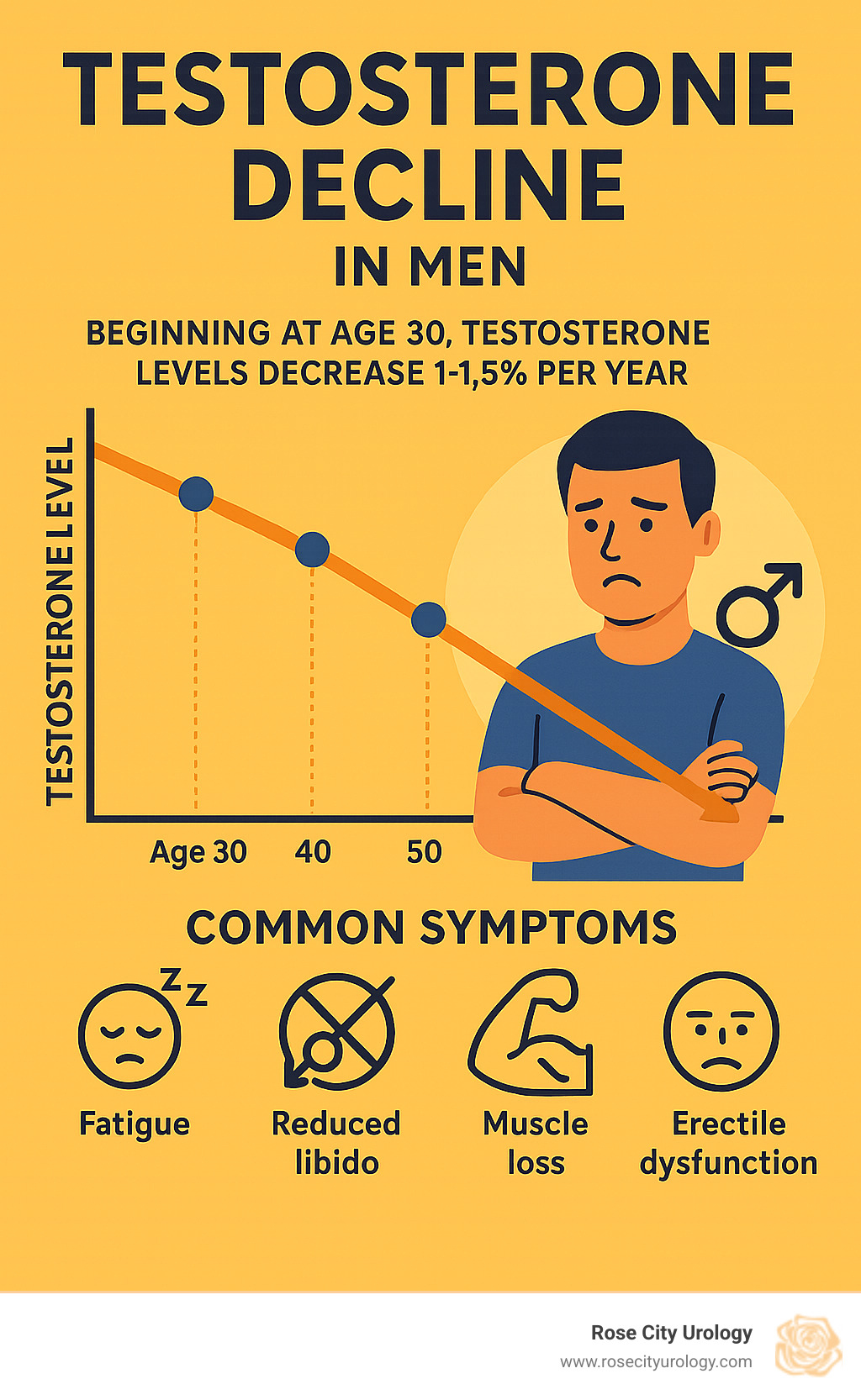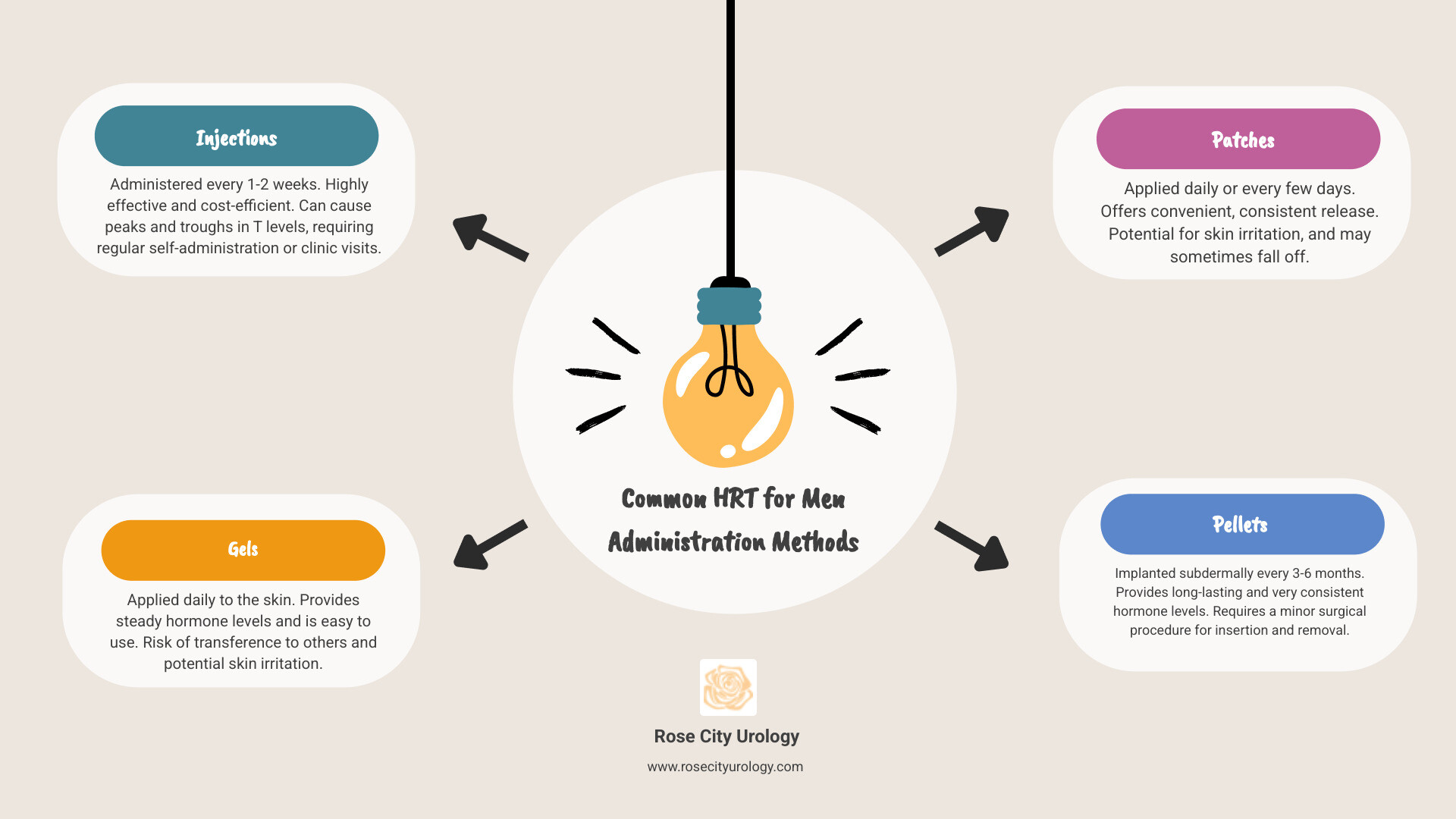
HRT for men (Hormone Replacement Therapy) is a medical treatment that supplements declining testosterone levels to manage symptoms like fatigue, reduced libido, and muscle loss.
Key Facts About HRT for Men:
Men over 30 lose about 1-1.5% of their testosterone annually. This natural decline can significantly impact your quality of life. The decision to pursue HRT isn't just about aging gracefully—it's about maintaining your health and vitality. Understanding your options is the first step toward feeling like yourself again.
I'm Dr. Ryan Tubre, a board-certified urologist at Rose City Urology in Tyler, Texas. I specialize in HRT for men, helping patients steer hormone health with personalized treatment plans to restore vitality.

Low testosterone, or hypogonadism, occurs when your body doesn't produce enough of this key hormone. While levels naturally decline about 1% per year after age 30, a significant drop can impact your daily life. This condition is common, affecting 19% of men in their 60s, and the prevalence increases with age. Recognizing the signs is the first step toward addressing the issue.

Many men mistake the subtle onset of low testosterone symptoms for normal aging. Pay attention if you experience several of the following:
If these symptoms sound familiar, you're not alone; testosterone deficiency affects about 1 in 200 men. Learn more from our guide on Low Testosterone.
Diagnosing low testosterone requires a thorough approach to get a full picture of your hormone health. The process includes:
For older men with symptoms, many specialists consider HRT for men when total testosterone falls below 300 ng/dl. This careful process ensures an accurate diagnosis. For more, see this scientific research on hypogonadism.
HRT for men, or Hormone Replacement Therapy, restores hormones your body is no longer making in sufficient amounts. Most often, this means Testosterone Replacement Therapy (TRT), which aims to bring testosterone levels back to a healthy range. The key question is whether you have a medical need for it, or are simply experiencing normal age-related changes. At Rose City Urology, we help you determine the right path for your health.

Not all low testosterone is the same. True hypogonadism is a medical condition where the testicles or pituitary gland malfunction, impairing hormone production. In this case, treatment is often necessary.
Age-related decline, sometimes called andropause, is the natural, gradual drop in testosterone after age 30. The FDA does not recommend testosterone products just to treat the normal effects of aging due to potential health risks. You can read The FDA's stance on TRT for aging for more information. Our job is to determine if your symptoms are from a medical condition or normal aging.
An ideal candidate for HRT for men is someone who will see clear benefits safely. We look for a combination of factors:
Men with active prostate cancer, untreated severe sleep apnea, uncontrolled heart failure, or a history of blood clots are generally not good candidates. Our goal is to ensure HRT for men is a life-changing fit, not a one-size-fits-all solution.
Deciding to start HRT for men requires a clear understanding of the potential benefits and risks. Every medical treatment has trade-offs, and our goal is to provide a complete picture so you can make an informed choice. We take a comprehensive approach to Men's Urologic Health to ensure the best outcome for you.

For the right candidate, HRT for men can lead to transformative improvements:
With careful monitoring, most risks can be managed or avoided. Potential side effects include:
Starting HRT for men is a carefully planned journey. At Rose City Urology, we partner with you to create a personalized treatment plan custom to your body, symptoms, and lifestyle. This process begins with a consultation with a specialist, like a urologist or endocrinologist, to ensure you receive expert care. Your plan will be unique, as what works for one person may not be the best fit for another. Learn more about our approach to Men's Hormone Replacement Therapy.
We will work together to choose the best delivery method for you:
Ongoing monitoring is key to successful treatment. Regular blood work is used to track hormone levels, red blood cell count, and Prostate-Specific Antigen (PSA) levels to ensure safety and effectiveness.
However, HRT for men isn't always the only answer. Lifestyle changes can produce remarkable improvements, sometimes even replacing the need for therapy:
These strategies can be used alone or to complement hormone therapy, giving your body every advantage.
Hypogonadism is a medical condition where the body doesn't produce enough testosterone to function optimally. While levels naturally decline about 1% per year after age 30, a significant drop can cause unwelcome changes. Studies show it affects 19% of men in their 60s, with the rate increasing with age. Recognizing the signs is the first step toward seeking help.
Symptoms can be subtle and are often dismissed as normal aging. A combination of these signs warrants investigation:
These symptoms affect approximately 1 in 200 men. For more detailed information on these symptoms, please visit our page on Low Testosterone.
Diagnosis is a thorough process involving a medical history review, a physical exam, and blood tests. We measure total testosterone, free testosterone, and Luteinizing Hormone (LH). For accuracy, blood is drawn in the morning (7-10 a.m.) when levels are highest. We often require at least two tests on different days to confirm low levels. A man may be considered hypogonadal if total testosterone is below 200 ng/dl. For older men with symptoms, treatment may be considered if levels are below 300 ng/dl. You can find more Scientific research on Hypogonadism here.
HRT for men, or Hormone Replacement Therapy, is a medical treatment to restore testosterone levels, often called Testosterone Replacement Therapy (TRT). The goal is to alleviate symptoms of low testosterone and improve well-being. The decision to start HRT requires careful consideration of medical necessity versus a lifestyle choice.
It's crucial to distinguish between two scenarios:
Our role is to help you determine if your symptoms stem from a medical condition or the natural aging process.
A good candidate for HRT for men typically has:
We perform prostate and cardiovascular screenings before and during therapy to ensure it is both effective and safe for your long-term health.
Starting on any medical treatment, especially one involving hormone modulation, requires an informed decision. We believe in transparency, thoroughly discussing both the potential upsides and the potential downsides of HRT for men to help you weigh the pros and cons. Our personalized treatment plans are designed to maximize benefits while carefully managing risks. You can learn more about general Men's Urologic Health on our website.
When appropriately prescribed and monitored, HRT for men can lead to significant improvements in various aspects of your health and well-being.
The potential benefits include:
Like any medical treatment, HRT for men carries potential risks and side effects. We ensure you are fully aware of these and are continuously monitored to mitigate them.
Some potential risks and side effects include:
We will discuss these risks in detail with you, tailoring your treatment plan to your unique health profile.
Starting HRT for men is a partnership focused on restoring your vitality and well-being. At Rose City Urology, we create a treatment plan that's specifically custom to your symptoms, health history, and lifestyle. Your journey begins with a comprehensive consultation with a specialist to ensure you receive expert care. For more detailed information about our approach, visit our page on Men's Hormone Replacement Therapy.

One of the first important decisions we'll make together is choosing how to deliver your HRT for men:
Once you start HRT for men, regular monitoring is crucial for safety and fine-tuning your treatment. Regular blood work tracks hormone levels, red blood cell count, and PSA levels for prostate health.
HRT for men isn't always the only answer. Lifestyle changes can work wonders:
These strategies can work alone or make your hormone therapy more effective. We believe in giving your body every advantage possible.
It's natural to have questions when considering HRT for men. Here are answers to some of the most common concerns we hear at Rose City Urology.
Results appear gradually. While HRT for men isn't an overnight fix, many men notice improvements on this general timeline:
Timelines vary for each individual, but consistency is key to achieving the best results.
No, HRT for men is not a fountain of youth and cannot reverse the aging process. However, it can effectively treat the specific symptoms caused by a testosterone deficiency. By restoring hormone levels, it can help you feel more energetic, vital, and like your old self again. The goal is not to reverse aging, but to optimize your health and improve your quality of life at any age.
Yes, this is a critical consideration. HRT for men signals your brain to reduce the hormones needed for sperm production, which can lead to a significantly lower sperm count and infertility. While this effect can be temporary, reversal is not guaranteed after stopping therapy. If you plan on having children in the future, it is essential to discuss this with us before starting treatment. We can explore alternatives or options like sperm banking to preserve your fertility.
You've learned about the signs of low testosterone and how HRT for men can help you reclaim your vitality. While not a magic solution, for the right person, it can be life-changing—restoring energy, confidence, and well-being.
Having the right medical team is crucial. At Rose City Urology in Tyler, Texas, we reject one-size-fits-all approaches. We provide thorough evaluations and develop personalized treatment plans that fit your unique health goals and lifestyle. Our commitment is to monitor your progress, ensure your safety, and provide expert guidance, whether you choose HRT or focus on lifestyle changes.
If you're experiencing symptoms like persistent fatigue or reduced libido, don't dismiss them as just "getting older." You deserve to feel your best.
Ready to explore if HRT for men is right for you? Let's talk about your concerns and find your path to better health.